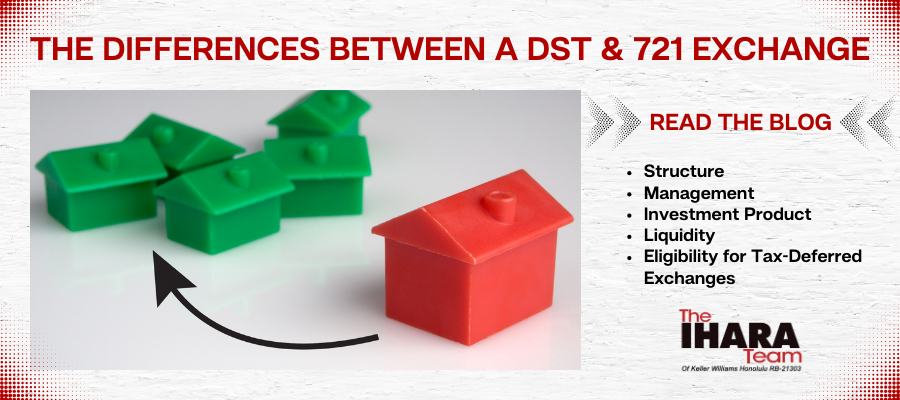The terms “DST” and “721 Exchange” refer to different real estate investment structures and strategies, each with its unique characteristics and purposes. Let’s break down what each term means and highlight their key differences.

DST (Delaware Statutory Trust)
A Delaware Statutory Trust (DST) is a legal entity created under Delaware law that allows for fractional ownership of real estate. Investors can buy into a DST to own a share of a larger, often institutional-grade property. This structure offers several benefits:
– Passive Investment: Investors do not manage the property; a trustee oversees all management activities.
– Diversification: Allows investors to own a portion of large, high-quality real estate assets that might be out of reach individually.
– 1031 Exchange Eligibility: DSTs are eligible for 1031 exchanges, allowing investors to defer capital gains taxes by reinvesting proceeds from the sale of one property into a DST.
721 Exchange
A 721 Exchange refers to a transaction under Section 721 of the Internal Revenue Code (IRC). This section allows investors to contribute property they own into a Real Estate Investment Trust (REIT) in exchange for shares in the REIT, without recognizing a capital gain or loss at the time of the exchange. Key aspects include:
– REIT Investment: Investors exchange real property for an ownership interest in a diversified real estate portfolio managed by the REIT.
– Tax Deferral: Like the 1031 exchange, a 721 exchange provides a mechanism for deferring capital gains taxes, but in this case, through the contribution to a REIT.
– Diversification and Liquidity: REIT shares offer more liquidity compared to direct real estate investments and allow investors to diversify across various properties and real estate sectors.
Key Differences
1. Structure: DSTs are trusts that allow for fractional ownership of a single property or portfolio, whereas a 721 Exchange involves contributing property to a REIT in exchange for shares.
2. Management: DST investors have no control over the property, while REIT shareholders invest in a company that manages a diverse portfolio of real estate assets.
3. Investment Product: DST is a direct investment in real estate, while a 721 Exchange results in ownership of REIT shares, representing indirect investment in a portfolio of real estate.
4. Liquidity: REIT shares may offer more liquidity compared to interests in a DST due to the potential for trading on public exchanges.
5. Eligibility for Tax-Deferred Exchanges: Both strategies offer tax deferral mechanisms but under different sections of the IRC (1031 for DSTs and 721 for REIT contributions).
In summary, while both DSTs and 721 Exchanges offer opportunities for real estate investment and tax deferral, they cater to different investor needs regarding management, control, liquidity, and the nature of the investment (direct vs. indirect). Investors should consider their investment goals, risk tolerance, and the specifics of each option when deciding between a DST and participating in a 721 Exchange.


Leave a Reply